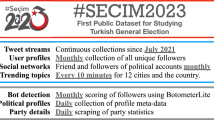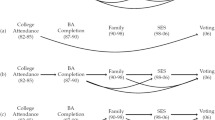Abstract
From 1970 to 2018, either the Québec Liberal Party or the Parti Québécois won the elections in Québec. The Coalition Avenir Québec ended this long period of bipartisan alternation by winning a majority of seats in the 2018 election. Using datasets that cover five elections (2007, 2008, 2012, 2014, and 2018) over a period of 11 years, we provide a unique longitudinal perspective of citizens’ vote choice calculus. More specifically, we analyse long-term factors that are known to be crucial to make sense of electoral outcomes. Do factors such as generations, sex, attitudes towards Québec sovereignty and party identification have the same weight in voters’ calculus over time? Our results show a relative stability, but also several interesting variations, especially regarding the effect of support for Québec independence. This perspective deepens our understanding of recent political developments in Québec politics.









Similar content being viewed by others
Notes
The authors would like to thank many people who provided comments on previous versions of this paper. Ruth Dassonneville, Éric Bélanger, André Blais, Jean-François Godbout, Benjamin Ferland, and Philippe Mongrain are among them, as well as the attendees of a conference on the Québec 2018 election in January 2019 at McGill University and at the workshop «50 ans du Parti québéois: bilan et perspectives» (organized by Éric Montigny and Pascale Dufour) in Ottawa during the SQSP 2018 annual meeting.
The closest work is the one from Lemieux (1969, ed.), but it includes four elections, uses a very different methodological approach, and studies elections going back to 1956.
As it is regularly the case with Québec elections since 1970, our data show an underestimation of support for the PLQ in 2007 and 2012. This bias in polls is widely acknowledged in the literature (Durand 2013; Pinard 2005) and not a specificity of our data. It should also be noted that the PQ was slightly overestimated in 2012, which is most likely a direct consequence of the underestimation of the PLQ during that same election.
The age range for each generation in a given election is as follows: Millennials: 19–26 in 2007, 20–27 in 2008, 24–31 in 2012, 26–33 in 2014, 30–37 in 2018; X: 27–42 in 2007, 28–43 in 2008, 32–47 in 2012, 34–49 in 2014, 38–53 in 2018; Baby Boomers: 43–61 in 2007, 44–62 in 2008, 48–66 in 2012, 50–68 in 2014, 54–72 in 2018; Silent: 62 and older in 2007, 63 and older in 2008, 67 and older in 2012, 69 and older in 2014, 73 and older in 2018.
Results stand if we separate respondents with less than high school education completed from the first category or if we use this variable as categorical.
Due to the lack of space, we present the results for dichotomic and linear variables, but our replication files are publicly accessible.
Facal (2018) could not be clearer: ‘For a long time, our political debate was focused around federalist and sovereigntists. It is not the case anymore’ (translated from French).
References
Bartels, Larry. 2002. Beyond the Running Tally: Partisan Bias in Political Perceptions. Political Behavior 24 (2): 117–150.
Bastien, Frédéric, Éric Bélanger, and François Gélineau (eds.). 2013. Les Québécois aux urnes: les partis, les médias et les citoyens en campagne. Montréal: Les Presses de l’Université de Montréal.
Bélanger, Éric, Richard Nadeau, Ailsa Henderson, and Eve Hepburn. 2018. The National Question and Electoral Politics in Quebec and Scotland. Montréal and Kingston: McGill-Queen’s University Press.
Bélanger, Éric, and François Gélineau. 2011. Le vote économique en contexte de crise financière : l’élection provinciale de 2008 au Québec. Canadian Journal of Political Science/Revue canadienne de science politique 44 (3): 529–552.
Bélanger, Éric, and Richard Nadeau. 2009. Le comportement électoral des Québécois. Montréal: Les Presses de l’Université de Montréal.
Bisgaard, Martin. 2015. Bias will Find a Way: Economic Perceptions, Attributions of Blame, and Partisans Motivated Reasoning During Crisis. The Journal of Politics 77 (3): 849–860.
Bittner, Amanda. 2018. Leaders Always Mattered: The Persistence of Personality in Canadian Elections. Electoral Studies 54: 297–302.
Blais, André, Elisabeth Gidengil, Richard Nadeau, and Neil Neville. 2002. An Anatomy of a Liberal Victory. Making Sense of the 2000 Canadian Election. Toronto: University of Toronto Press.
Blais, André, Mathieu Turgeon, Elizabeth Gidengil, Neil Nevitte, and Richard Nadeau. 2004. Which Matters Most? Comparing the Impact of Issues and the Economy in American, British and Canadian Election. British Journal of Political Science 34 (3): 555–563.
Blais, André, and Jean-François Daoust. 2017. What do Voters do When They Like a Local Candidate from Another Party? Canadian Journal of Political Science/Revue canadienne de science politique 50 (4): 1103–1109.
Campbell, Philip E., Warren E. Converse, Angus Miller, and Donald E. Stokes. 1960. The American Voter. Chicago: University of Chicago Press.
Clark, Terry Nichols, and Seymour M. Lipset. 1991. Are Social Classes Dying? International Sociology 6 (4): 397–410.
Dalton, Russell, and Martin P. Wattenberg. 2002. Parties Without Partisans: Political Change in Advanced Industrial Democracies. Oxford: Oxford University Press.
Daoust, Jean-François. 2015. Vote stratégique: analyse de l’élection québécoise de 2012. Politique et Sociétés 34: 1–22.
Daoust, Jean-François, André Blais, and Gabrielle Péloquin-Skulski. 2019. What do Voters do When They Prefer a Leader from Another Party? Party Politics. https://doi.org/10.1177/1354068819845100.
Dassonneville, Ruth. 2020. Change and continuity in the ideological gender gap: a longitudinal analysis of left-right self-placement in OECD countries. European Journal of Political Research. https://doi.org/10.1111/1475-6765.12384.
Durand, Claire. 2013. Les sondages et l’élections québécois de 2012. In Les Québécois aux urnes, ed. Frédérick Bastien, Éric Bélanger, and François Gélineau. Montréal: Presses de l’Université de Montréal.
Dufresne, Yannick, Charles Tessier, and Éric Montigny. 2019. Generational and Life-Cycle Effects on Support for Quebec Independence. French Politics. https://doi.org/10.1057/s41253-019-00083-9.
Facal, Joseph. 2018. Le temps des girouettes. Journal de Montréal. https://www.journaldemontreal.com/2018/09/27/le-temps-des-girouettes. Accessed 17 Apr 2020.
Franklin, Mark, Thomas T. Makie, and Henry Valen. 2009. Electoral Change: Responses to Evolving Social Attitudinal Structures in Western Countries. Colchester: ECPR Press.
Gidengil, Elisabeth and Allison Harell. 2013. L’appui des québécoises aux partis politiques provinciaux. In Les Québécois aux urnes: les partis, les médias et les citoyens en campagne, eds. Frédéric Bastien, Éric Bélanger, and François Gélineau. Montréal: Les Presses de l’Université de Montréal.
Gidengil, Elisabeth, Neil Nevitte, André Blais, Joanna Everitt, and Patrick Fournier. 2012. Dominance and Decline. Toronto: University of Toronto Press.
Giger, Nathalie. 2009. Towards a Modern Gender Gap in Europe? A Comparative Analysis of Voting Behavior in 12 Countries. The Social Science Journal 46 (3): 474–492.
Godbout, Jean-François. 2013. Les élections au Québec de 1973 à 2012. In Les Québécois aux urnes: les partis, les médias et les citoyens en campagne, eds. Frédéric Bastien, Éric Bélanger, and François Gélineau. Montréal: Les Presses de l’Université de Montréal.
Hanmer, Michael J., and Kerem Ozan Kalkan. 2013. Behind the Curve: Clarifying the Best Approach to Calculating Predicted Probabilities and Marginal Effects from Limited Dependent Variables Models. American Journal of Political Science 57 (1): 263–277.
Inglehart, Ronald, and Pippa Norris. 2000. The Developmental Theory of the Gender Gap: Women’s and Men’s Voting Behavior in Global Perspective. International Political Science Review 21 (4): 441–463.
Kanji, Mebs, Antoine Bilodeau, and Thomas Scotto. 2012. The Canadian Election Studies: Assessing Four Decades of Influence. Vancouver: UBC Press.
Latouche, Daniel, Guy Lord, and Jean-Guy Vaillancourt (eds.). 1976. Le processus électoral au Québec: les élections de 1970 et 1973. Montréal: Cahiers du Québec/Hurtubise HMH.
Lemieux, Vincent (ed.). 1969. Quatre élections provinciales au Québec. Québec: Les Presses de l’Université Laval.
Lewis-Beck, Michael, William G. Jacoby, Helmut Norpoth, and Herbert F. Weisberg. 2008. The American Voter Revisited. Michigan: The University of Michigan Press.
Mahéo, Valérie-Anne, and Éric Bélanger. 2018. Is the Parti Quebecois Bound to Disappear? A Study of the Current Generational Dynamics of Electoral Behaviour in Quebec. Canadian Journal of Political Science/Revue Canadienne de science politique 51 (2): 356–365.
Mair, Peter, and Ingrid van Biezen. 2001. Party Membership in Twenty European Democracies, 1980–2000. Party Politics 7 (1): 5–21.
Miller, E.Warren, and J. Merrill Shanks. 1996. The New American Voter. Cambridge: Harvard University Press.
Nadeau, Richard and Éric Bélanger. 2013. Un modèle général d’explication du vote des Québécois. In Les Québécois aux urnes: les partis, les médias et les citoyens en campagne, eds. Frédéric Bastien, Éric Bélanger, and François Gélineau. Montréal: Les Presses de l’Université de Montréal.
Pinard, M. 2005. Political Ambivalence Towards the Parti Québécois and its Electoral Consequences, 1970–2003. Canadian Journal of Sociology 30: 281–314.
Stephenson, Laura B., and Jean Crête. 2011. Studying Political Behavior: A Comparison of Internet and Telephone Surveys. International Journal of Public Opinion Research 23 (1): 24–55.
Vallée-Dubois, Florence, Ruth Dassonneville, and Jean-François Godbout. 2017. About Time: Age, Period, and Cohort Effects on Support for Quebec Sovereignty. Nations and Nationalism 26: 1–22.
Yale, François, and Claire Durand. 2011. What did Quebeckers Want? Evolution of Support for Sovereignty 1976–2000. American Review of Canadian Studies 42 (3): 242–258.
Author information
Authors and Affiliations
Corresponding author
Additional information
Publisher's Note
Springer Nature remains neutral with regard to jurisdictional claims in published maps and institutional affiliations.
Electronic supplementary material
Below is the link to the electronic supplementary material.
Rights and permissions
About this article
Cite this article
Daoust, JF., Jabbour, A. An extraordinary election? A longitudinal perspective of the Québec 2018 election. Fr Polit 18, 253–272 (2020). https://doi.org/10.1057/s41253-020-00120-y
Published:
Issue Date:
DOI: https://doi.org/10.1057/s41253-020-00120-y




